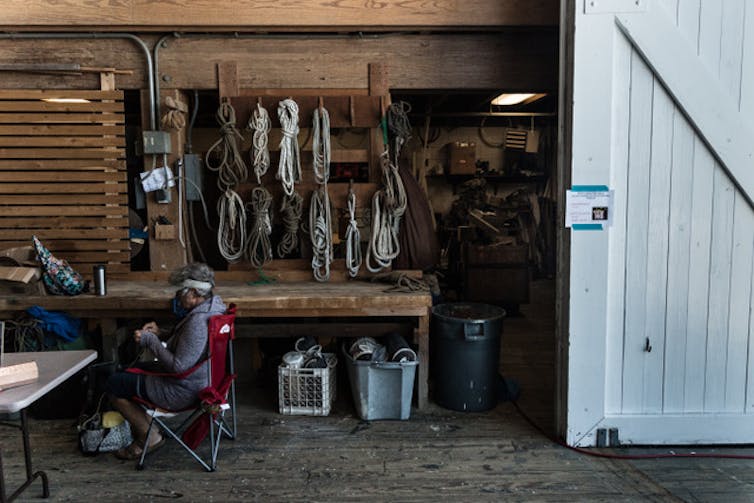Trump voters are not the obstacle to climate action many think they are
Another day brings another monster tide for residents of Carteret county, North Carolina, whose coastal towns and villages are being swallowed by the rising Atlantic. Nonetheless, its voters returned Donald Trump to the White House, a man who denies the science of climate change and had withdrawn his country from the Paris agreement on climate change (for a second time) before the sun had even set on his first day back in office.
It is a contradiction that has captured the imaginations of many. In 2017, when Trump first quit the agreement which symbolically pledges countries to limit global heating to well below 2°C, the word “denialism” lit up late-night talk shows and circulated at annual UN summits.
Denialism evokes a pathological rejection of the reality of climate change. It has come to imply a public that can no longer tell fact from fiction, often to their own detriment. Meanwhile, climate-conscious leaders in a handful of Democratic states have repeated their commitment to scientific facts.
As an anthropologist, I felt uncomfortable with the way the fabled Trump voter was spoken about while rarely being allowed to speak for themselves. I have participated in climate politics as a researcher, activist and diplomat, and I felt there was little reflection among the treaty’s advocates about their own role in the US departure.
 Donald Trump campaigning in Greensboro, North Carolina in October 2024. EPA-EFE/Erik S. Lesser
Donald Trump campaigning in Greensboro, North Carolina in October 2024. EPA-EFE/Erik S. LesserI started a PhD to understand the non-participants of climate politics. It took me to coastal North Carolina where, like so many other American communities, the effects of climate change sit alongside a seeming indifference to the crisis.
I wanted to understand how people here related to climate science, and what this thing called denialism actually looked like. I spent a year talking to residents with “Trump Won” flags on their lawns, but I also met scientists, government officials, activists and Democrats.
Here is one thing I found, and one thing I didn’t.
Culture trumps ‘facts’
The science of climate change is incredibly robust, but science alone cannot tell us what makes a solution fair, or who should get a say in its design. The Paris agreement, for example, has a strong moral component that was hard won by developing nations, small island states and international activists.
It depicts a world in which the blame for climate change and the responsibility for addressing it lie predominantly with rich countries such as the US, and it prescribes financial flows to victim countries to help them adapt. For many precarious Americans who feel neither rich nor villainous, this is a difficult narrative to swallow.
I saw a similar pattern in my own research. Racial justice, indigenous knowledge, urban inequality and youth are themes that typically frame public engagement with climate action by the federal government and grassroots movements. These aren’t necessarily topics that will always resonate in rural, conservative communities such as Carteret county.
Opinion surveys and election data in the US show that climate change is an issue on which voters are polarised.
 Fishing has been a major local employer in North Carolina for several generations. Karl Dudman
Fishing has been a major local employer in North Carolina for several generations. Karl DudmanThis helps explain why advocates for climate action tend to speak to the already engaged, by referencing other progressive causes. But advocates are not necessarily more influenced by facts than sceptics. It’s simply easier to sign up to a cause you can see yourself in.
‘Denialism’ is a weak concept
What I didn’t find in North Carolina was what I came looking for: climate denialism. Climate change rarely came up naturally in the conversations I had in Carteret county, but when it did, the responses were inconsistent, ranging from concern to curiosity and from ambivalence and apathy to fatalism and scepticism. What mention there was hardly fit the stereotype of bitter, conspiracy-fuelled rejection of reality.
In this tight-knit fishing community, people had become wary of outside interventions. Some were ill-disposed to environmental movements after feeling lectured by regulatory scientists or environmental campaigners on how to manage a coastline they knew well.
Others were fatalist about resisting sea-level rise – generations spent on the Atlantic’s ferocious frontline taught them that you don’t fight storms, you ride them out. Many people saw things were changing but were too strapped for time and money to do much, or else found it intolerable to wake up each day contemplating the death of their community.
 North Carolina’s fishers face several threats to their livelihood. Karl Dudman
North Carolina’s fishers face several threats to their livelihood. Karl DudmanDenialism had no explanatory power here. On the contrary, by failing to distinguish between disagreement and lack of agreement, it misrepresented complex social dynamics as a matter of simply believing facts or rejecting them.
So why does any of this matter? Because, when we identify one group as the sole cause of a problem we give ourselves permission to stop asking what we could be doing differently. After all, climate action’s advocates – from UN officers to individual voters – play a role in shaping what legitimate climate action looks like, and who will want to be part of it.
To react to the US withdrawal from Paris by repeating that “science is real”, in the vein of world leaders and American lawn signs, is to miss the point. Public dissent is often less a question of if we should fix climate change than of whose vision of a good world we are working towards.
This is not to shift blame for Trump’s withdrawal. Nor should it excuse people in politics, business and the media who have repeatedly obscured the climate debate in bad faith.
 Carteret’s older residents have seen the decline of local industries and ecosystems. Karl Dudman
Carteret’s older residents have seen the decline of local industries and ecosystems. Karl DudmanBut reducing public dissent to a matter of misinformation and gullibility shows a lack of humility and dismisses concerns that may not crystallise into opposition if treated respectfully. Asking more questions of ourselves is something we can all do to make climate politics less toxic.
As Trump signed his first executive orders, I pressed send on my thesis’s final corrections. How the international community reacts this time remains to be seen, but the last four years have taught me that it may influence whether or not there is a next time.
댓글
댓글 쓰기